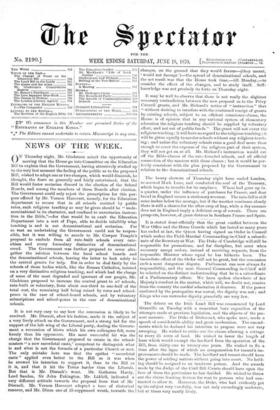It is not very easy to say how the concession
is likely to be received. Mr. Disraeli, after his fashion, made it the subject of a very lively attack on the Government, and a strong bid for the support of the left wing of the Liberal party, dealing the Govern- ment a succession of blows which his own colleagues felt, more keenly than his opponents. His most successful hit was the charge that the Government proposed to create in the school- masters "a new sacerdotal caste," competent to distinguish what is and what is not the formula of a particular Church or sect. The only mistake here was that the epithet "sacerdotal caste" applied even better to the Bill as it was when he avowed his intention to support it, than to the Bill as it is, and that it hit the Tories harder than the Liberals. But that is Mr. Disraeli's wont. Mr. Gathorne Hardy, Lord Sandon, Sir John Pakington, Mr. Liddell, indicated a very different attitude towards the proposal from that of Mr Disraeli. Mr. Vernon Harcourt adoptel a tone of rhetorical rancour, and Mr. Dixon one of ill-suppressed wrath, towards the I
changes, on the ground that they would favour—(they meant, would not damage ')—the spread of denominational schools, and the net result was that the House took time,—till Monday,—to consider the effect of the changes, and to study itself. Self- knowledge was not precisely its forte on Thursday night.






























